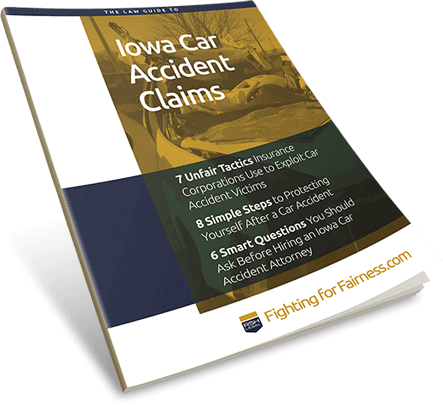Iowa’s weather can be as unpredictable as it is diverse, and its effects on road safety are significant. From blistering winters to humid summers, each season brings its own set of challenges for drivers navigating Iowa’s roads. Let’s delve into some real-life examples of how weather conditions affect car crashes.
Snow and Ice: A Slippery Slope
Iowa winters are notorious for their heavy snowfall and icy conditions, turning roadways into hazardous paths. Picture this: a driver is cruising down Interstate 80 during a snowstorm. The roads are slick with ice, and visibility is reduced to a mere few feet ahead. Suddenly, the driver loses control of their vehicle, sliding into the adjacent lane and causing a multi-car pileup. Instances like these are all too common during Iowa’s winter months, where snow and ice contribute to numerous accidents, injuries, and even fatalities.
Fog: Driving into the Unknown
During early mornings or late evenings, dense fog blankets Iowa’s highways, significantly impairing visibility for drivers. Imagine driving along Highway 20 in the wee hours of the morning, surrounded by thick fog that obscures road signs and fellow motorists. Without warning, a car emerges from the fog, barely visible until it’s too late to react, resulting in a rear-end collision. In such instances, fog becomes a silent but deadly accomplice to car accidents, emphasizing the importance of cautious driving and increased following distances.
Rain and Thunderstorms: Battling the Elements
Spring and summer bring relief from the cold but introduce a new set of challenges with frequent rain and thunderstorms. Consider a scenario where heavy rain transforms Interstate 35 into a waterlogged battlefield. As drivers struggle to navigate through flooded roads and reduced visibility, the risk of hydroplaning and losing control of vehicles skyrockets. Additionally, thunderstorms with powerful winds can topple trees onto roadways or cause sudden gusts that push vehicles off course, resulting in devastating accidents.
Wind: A Force to Be Reckoned With
Iowa’s vast open landscapes are susceptible to strong winds, particularly in rural areas. A driver traversing Highway 30 feels the full force of a gusty windstorm, causing their car to sway uncontrollably and veer dangerously close to the edge of the road. In such instances, maintaining control becomes a daunting task, with high winds posing a constant threat to vehicle stability and increasing the likelihood of accidents, particularly for larger vehicles like trucks and SUVs.
Extreme Temperatures: Testing Limits
Extreme temperatures, whether scorching hot or bitterly cold, can wreak havoc on Iowa’s roadways and vehicles alike. Imagine driving along Interstate 380 on a sweltering summer day when suddenly, the asphalt begins to buckle under the intense heat, creating hazardous road conditions. Conversely, during frigid winter nights, a driver experiences a tire blowout on Interstate 29 due to the cold weather causing tire rubber to harden and crack. These examples highlight how extreme temperatures can lead to unexpected road hazards and mechanical failures, culminating in accidents.
What to Do If You’re in a Car Accident
In the unfortunate event of a car accident, it’s essential to take immediate action to ensure your safety and protect your legal rights. Here’s what you should do:
- Check for Injuries: First and foremost, check yourself and others involved in the accident for injuries. If anyone is hurt, call 911 immediately for medical assistance.
- Move to Safety: If possible, move your vehicle to a safe location, away from oncoming traffic, to prevent further accidents or injuries.
- Exchange Information: Exchange contact and insurance information with the other driver(s) involved in the accident. Obtain names, addresses, phone numbers, license plate numbers, and insurance policy details.
- Document the Scene: Take photos of the accident scene, including vehicle damage, road conditions, skid marks, and any visible injuries. This documentation can be crucial for insurance claims and legal proceedings.
- Contact Law Enforcement: Report the accident to local law enforcement and cooperate with any responding officers. Obtain a copy of the police report for your records.
- Notify Your Insurance Company: Contact your insurance company as soon as possible to report the accident and initiate the claims process. Provide them with accurate and detailed information about the incident.
- Seek Medical Attention: Even if you don’t feel injured immediately after the accident, it’s essential to seek medical attention promptly. Some injuries may not be apparent right away, and early medical intervention can prevent complications.
- Consult with a Car Accident Lawyer: Consider consulting with an experienced car accident lawyer to understand your legal rights and options. A lawyer can help you navigate the claims process, negotiate with insurance companies, and pursue compensation for your damages.
We offer free, no-obligation case evaluations to Iowans who have been injured in car accidents. Call RSH Legal at 1-800-433-0283 today.




